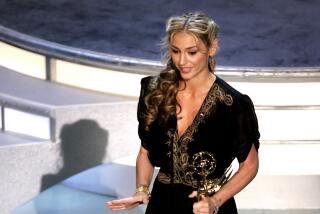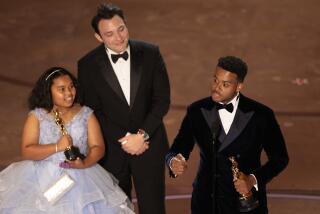Donald Trump provides unconventional story for TV coverage of convention
In 1952, TV manufacturers with such now-forgotten brand names as Philco, Admiral and Westinghouse were the exclusive sponsors of network coverage of the Democratic and Republican national conventions.
They sought to motivate Americans to head to their local appliance dealer to purchase their first televisions, and ABC, CBS and NBC helped by offering viewers hours of meetings in smoke-filled rooms, rallies, speeches and balloon drops that accompanied the selection of Dwight D. Eisenhower and Adlai Stevenson as the parties’ nominees. Bob Hope even showed up at the end of NBC’s coverage each night to deliver a few gags about the day’s proceedings.
Sixty-four years later, the conventions provide little in the way of drama thanks to the lengthy primary process that chooses the presidential candidates well ahead of time. As a result, the broadcast networks air just one prime-time hour per night (PBS airs three hours nightly). But the two four-day events, the first of which starts Monday with the Republicans in Cleveland, are still used to drum up business for cable news and online video streaming. They are also a boon to late-night comedy.
The stunning development of having Donald Trump as the Republican nominee brings an element of unpredictability to the GOP’s event, which is not lost on network executives who have covered the coronation-like conventions of recent decades.
“This is a bit of a wild card,” said CNN Washington Bureau Chief Sam Feist, who has covered 14 political conventions. “There are always elevated ratings levels on CNN for convention coverage, and one might predict that a Donald Trump convention will be even higher.”
All of the cable news channels will be based in Cleveland and then Philadelphia for the nomination of Hillary Clinton at the Democratic convention, which starts July 25. The broadcast networks will have their morning shows and evening newscasts based on site as well. Additional reporters and producers are showing up for any possible civil unrest outside the convention areas.
With the intense interest comes a business opportunity. CBS News is looking to the conventions to boost to its live streaming channel CBSN. Launched in November 2014, the 24-hour video service available to broadband Internet users without a cable subscription will have gavel-to-gavel coverage of both events.
While free online streams of the convention proceedings are available on Facebook, YouTube and C-SPAN’s website, CBSN is offering reporting and analysis from CBS reporters and anchors around the clock, a throwback to the days of Walter Cronkite. CBS also has a deal to have the stream carried on social media site Twitter, which is looking to offer more video content to its users.
CBS News President David Rhodes believes continuous coverage of big events are what can draw younger viewers to sample CBSN, especially as an “over-the-top” alternative to cable news channels such as CNN, Fox News and MSNBC. A recent study from the research firm GsK finds that 38% of 18- to 34-year-olds now live in households that don’t rely on a cable or satellite subscription for television.
“We think those viewers who are cord-cutters and have broadband internet will come to us when there is news and then spend more time with us,” Rhodes said.
ABC News is also providing a live stream of additional convention coverage over its streaming video channel to supplement its broadcast news programs.
Cable news networks have already seen how the conventions can bring new viewers into their tents. Fox News Channel’s positioning as a network for viewers who perceive other outlets as too liberal is reflected in the ratings for its Republican convention coverage, which have increased every four years. Fox News Channel delivered more than 6 million viewers – more than any broadcast or cable network – on the nights when the GOP candidates gave their acceptance speeches in 2008 and 2012.
Jay Wallace, executive vice president for news and editorial at Fox News, said a chunk of those viewers stick around after they sample its prime-time hosts such as Bill O’Reilly or Sean Hannity, who can deliver commentary when it gets a little dull on the convention stage.
“The great thing about it is, if it’s someone who we don’t feel is particularly interesting we’ll go with the stars who got us here,” Wallace said. “Having those guys in the stable, they will always fill the gap.”
NBC’s cable news channel MSNBC got a ratings lift during the Democratic conventions in 2008 and 2012. But the network has moved away from progressive political commentary during the day and put a greater focus on breaking news. Executives expect convention viewers who have not watched lately to notice the shift that has occurred throughout the 2016 campaign season.
“It’s something we’ve been doing throughout the cycle,” said an NBC News spokesperson. “But this will be a main stage for the greater synchronicity between NBC News and MSNBC.”
While Trump has been a shot of ratings adrenaline for TV news, he’s also been comedy gold for late-night TV. Several shows are staying up late to do live commentary after the conventions to ensure that they will be part of the conversation the next morning.
Comedy Central announced Friday that “The Daily Show With Trevor Noah,” which has not been high on the radar in the current campaign season, will do live shows after each night of both conventions, joining “Real Time With Bill Maher” on HBO, NBC’s “Late Night With Seth Meyers” and “The Late Show With Stephen Colbert” on CBS. (Former “Daily Show” host Jon Stewart is set to have a cameo on “Colbert.”)
“The idea that we can digest and talk about it is an obvious idea we should have thought of a long time ago,” said “Late Night” executive producer Mike Shoemaker. “It’s too good to pass up.”
Of course, for many young viewers, late night will be how they learn about the conventions as studies repeatedly say the comic programs are often a primary news source.
“I used to believe that was not true,” Shoemaker said. “Now I have to say I learn about a lot of news when we go up with our monologue every day.”
Twitter: @SteveBattaglio
More to Read
From the Oscars to the Emmys.
Get the Envelope newsletter for exclusive awards season coverage, behind-the-scenes stories from the Envelope podcast and columnist Glenn Whipp’s must-read analysis.
You may occasionally receive promotional content from the Los Angeles Times.







